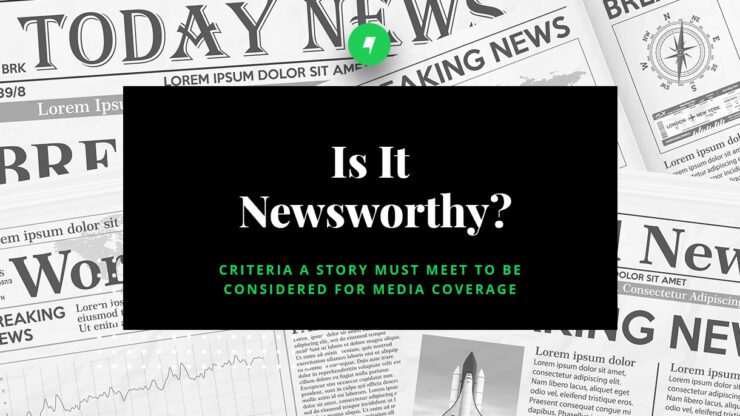Let’s play a game called “Is this News?”
One of the main job functions of a public relations practitioner is to identify or create newsworthy stories for the media to share. Sounds easy, right? Not necessarily. As a PR professional, you know how often a client shares a story that they’re convinced is newsworthy, but you know otherwise.
To determine if a story is newsworthy, put yourself in the shoes of a reporter and decide if their audience would be interested in the topic and if it makes sense for the reporter’s beat or interests.
What makes a story newsworthy? Here are a few tips:
Timing
Sometimes, a potential story is all about the right timing. A future groundbreaking event may be newsworthy because it hasn’t happened yet and gives a reporter time to attend or include it in a trend article. A groundbreaking that happened a week ago is no longer newsworthy.
Example: A real estate developer is holding a grand opening ceremony for a new and exciting residential tower in Philadelphia. To garner media interest, draft a media advisory to be distributed a week before the event and distribute a press release with images directly after the ceremony.
Significance
Is your news more important than what is being covered in the media right now? Will a lot of people be affected or impacted by the news? If so, it’s probably newsworthy.
Example: If a major car company has a major recall, this is something that is most likely going to affect a lot of people, making the story significant.
Proximity
Where did the story originate? It is important to decide if the story is local, regional or national. Another way to utilize proximity is to take a national headline and decide if there is a local impact.
Example: Earlier this year, the U.S. Supreme Court narrowed the impact of the EPA’s Clean Water Act, limiting the EPA’s jurisdiction over wetlands. This is a national story that affects a lot of local communities. Determine if you can localize the news to demonstrate how it impacts a specific community.
Prominence
Did something specific happen to a company or someone of importance? If a person or company is influential in the community and has an announcement, it’s probably newsworthy.
Example: If a multi-million-dollar corporation suddenly files for bankruptcy, that is newsworthy. If you file for bankruptcy, it’s not likely going to get covered.
Human Interest
Can you tell the story in a way that evokes emotion such as amusement or sadness? Are there individuals outside of your client who have been impacted and are willing to share their story? If so, it might be newsworthy.
Example: A person reaches the incredible milestone of reaching 100 years old and is interviewed about how they were able to live this long and some secrets to reaching this age.
Bizarre
In some instances a story you’re pitching is unexpected, surprising, weird and well… bizarre.
Example: Philadelphia was down on its luck after the Phillies suffered a World Series defeat and the Union lost their championship. Well, a man who loved rotisserie chicken appeared from the abyss. On November 8th, he gathered people at an abandoned pier by a Philadelphia Walmart to eat his 40th rotisserie chicken.
Conflict
Can you position your client on one side of an important or prominent issue? Is it an issue that tends to cause conflict between different parties? If so, it might be newsworthy.
Example: You represent a nonprofit that advocates for more gun regulations.
Trending
Can you tie your client into a hot topic that everyone is talking about or following? It may be a topic that has gained momentum on its own but is now relevant, albeit a for a short time. If so, it may be newsworthy.
Example: When Starbucks releases a seasonal beverage like the Pumpkin Spice Latte, this will always garner news coverage and signal the start of fall.
Putting Your Story to the Test
Follow these tips the next time you’re trying to determine whether something is newsworthy. Happy pitching!
Posted In Media Relations
